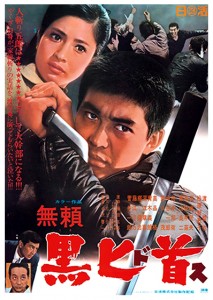AKA: Gangster VIP 5
Director: Keiichi Ozawa
Cast: Tetsuya Watari, Chieko Matsubara, Kunie Tanaka, Sanae Kitabayashi, Kaku Takashina, Yoshiro Aoki
Running Time: 86 min.
By Kelly Warner
Outlaw: Black Dagger begins the way most the other Outlaw films end: a bloody knife fight, tragedy, and a love story interrupted. This opening sequence is actually the film’s finest moment, giving us drama and action with no shortage of style. During the sequence, Goro (Tetsuya Watari) faces off against his rival Sueo while his lady love Yuri (Chieko Matsubara) rides a train out of town… or so he thinks. Yuri comes out of the train station, sees the fight in progress, and tries to intervene. During the struggle, Sueo accidentally cuts Yuri with his blade. She dies right there on the street, leaving Goro heartbroken and making Sueo his sworn enemy.
But that’s not the end of Chieko Matsubara’s participation in this particular film. The actress, who has played a different character in all but two of the Outlaw films so far, returns to Black Dagger as yet another character after Yuri’s death. At this point in the series, the decision to give Matsubara two different parts in the same film feels something like self-parody. They’re not even twins or sisters, either. They’re both just inexplicably identical. At least the other characters notice this time, though. Matsubara’s second role is a nurse who tends to Goro after he’s injured. When Goro first sees her, he is struck by how much she resembles his lost love (I like to think that Goro’s deeply troubled by the fact that 80% of the women he meets share the same exact face). Goro’s nemesis Sueo also runs into Matsubara’s nurse, and though at first he’s haunted and confused to see the doppelganger of the woman he accidentally killed, he soon switches gears and decides to woo her. Sueo stalks the nurse everywhere, apparently thinking that’s the best way to win a woman’s heart. Later on, Goro, Seuo, and the nurse run into each other at the same time, at which point Sueo abruptly gives up the game and the nurse falls head-over-heels in love with Goro. The relationships in Black Dagger are about as forced as stuffing a triangle block through a square-shaped hole.
Black Dagger is the weakest film of the Outlaw series. The story is generic, with Goro trying to go straight (again) and getting caught up in yakuza affairs that have little to do with him. While Goro acts as Black Dagger’s hero, it’s difficult to call him the main character. I don’t even know if he cracks the Top 3 most important characters when it comes to pushing the plot where it needs to go. At the center of things is a good-natured yakuza who’s married to one of Goro’s other former romances. Sueo’s gang is muscling in on the local yakuza’s turf. In order to appease Sueo’s gang, the yakuza is ordered to give his wife to their rivals. “It’s only a woman,” explains his superior. When he refuses, it begins a series of bloody confrontations. Only then does Goro become useful to the plot, as he slices and dices better than all the rest. What’s unfortunate is that in the many scenes where Watari’s not onscreen, the rest of the cast provides generally subpar performances. The characters are overly familiar but that’s not the problem. Many actors look stiff and others frankly coming across silly. Only Tetsuya Watari, Chieko Matsubara, and Kunie Tanaka (as a doctor) manage to impress, and even they don’t look as into it as they did in earlier films.
While I do think this is the weakest entry, I still thought it was rather entertaining most of the time. Black Dagger has a good deal of action and Keiichi Ozawa continues to improve as a director, filming the brawls with style and chaotic energy. This is the most violent Outlaw film, with a seemingly endless body count. Goro’s flow is interrupted in one fight scene when he’s unable to pull his dagger out of a dead man’s spine—it’s a nasty beat in the bloody action, helping the scene’s pacing in a cool way. Though Goro rarely walks away unscathed from his many brawls, his status as “the Assassin” has become legendary at this point in the series, and for good reason. He’s almost an invincible adversary. Goro could be outnumbered 50 to 1 and you’d still call those even odds. By this point, the Outlaw series has largely shrugged off the realism depicted in the first film. And I’m mostly okay with that. Similar to sequences found in action-packed samurai flicks, the Outlaw series is full of good hack ’n slash fight scenes, and Black Dagger has some of the series’ best examples of such sequences.
It’s just too bad that the film’s human elements are so lacking. Though entertaining, it’s hard to call Black Dagger a “good movie.” The story is generic, the acting is mediocre, and Chieko Matsubara playing two roles within the same film is a bit of a headscratcher. The Outlaw series has some ups and downs but I’ve enjoyed getting a chance to work my way through the films. Looking forward to the final film, Outlaw: Kill!
Kelly Warner’s Rating: 6/10





